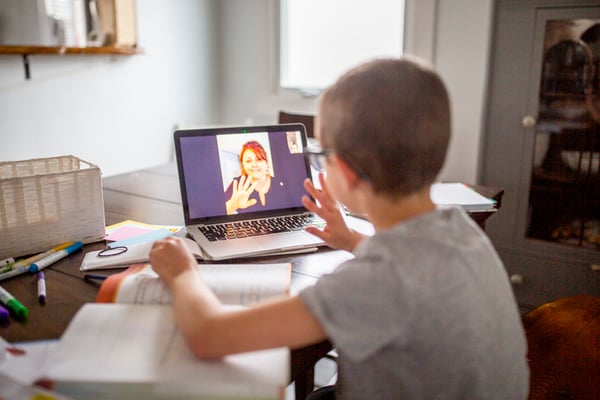Teletherapy for Autistic Children: Research-Based Best Practices
STAGES® Learning worked hard at building an online distance learning platform designed specifically to provide teletherapy to autistic children. Distance Learning, also called remote learning for autistic children, has been proven to be effective as a therapeutic intervention for autistic children.
The Stages Learning Line platform design draws on current research on remote learning for autistic children to provide the most effective services. The following article provides a summary of the research on teletherapy and autism that helped inform the design of our new platform.
Staff at Stages was initially motivated to create our new distance learning platform by a desire to help children with special needs during the COVID pandemic, as remote learning or hybrid (partial) remote learning was adopted by many schools across the country. However, the creation of a new online distance-learning platform has been on our agenda for many years. Our original goal was to create teletherapy services for children who live in rural areas, where it is much harder to find specialists with degrees in Applied Behavior Analysis (ABA), Speech-Language Pathology, and other therapies that help autistic children develop language and behavioral skills. Down the road, we hope our new platform will grow to provide services and assistance to families and children in other countries who don't have the same access to autism education as we do in the U.S.
What Does the Research Say About Distance Learning and Autism?
While staff at Stages Learning have over 20 years of experience designing tools for autistic children, we wanted to ensure that our new platform used any available research that demonstrated research-based best practices for remote learning for autistic children.
Initial research on using online distance learning for autistic children is showing encouraging findings (Simacek, et al., 2020; Vismara, et al., 2009). Some studies note that while remote learning may not be the ideal environment for working with autistic children, it can be used effectively to augment in-person learning and bridge the gap between intervention resources required to help autistic children and available resources within the local community.

A recent review of the research on remote learning and autism concluded that “services delivered via telehealth were equivalent to services delivered face-to-face, and superior to comparison groups without telehealth sessions” (Sutherland, et al., 2018). Two meta-analyses of the existing research on teletherapy for autistic children show encouraging findings in terms of efficacy data (Simecek et al., 2020; Piccininni, et al., 2017). Researchers also point out some additional significant advantages of telehealth, including cost savings, reducing the time between an autism diagnosis and providing therapy, and support to families. In Minnesota, for example, the time from autism diagnosis to treatment for Medicaid-enrolled families is 9 months (Dimian et al., 2020). Teletherapy can help bridge these delays before in-person services take place. Getting diagnosed children connected to services as soon as possible is crucial for autistic children: Early intervention can have major long-term positive effects on symptoms and later skill development (NRC, 2001; Olley, 2005; Helt et al., 2008). Cost savings are estimated at $267,000 per individual if wait times were eliminated for therapeutic intervention shortly after diagnosis (Dimian et al., 2020).
Distance learning for autistic children can also reduce family stress by cutting down on the amount of travel needed to receive extensive ABA or other therapies. Creating a home-based program remotely allows the therapist to work more closely with the family and document the care being given, capturing video sessions, charting progress, and adjusting or making changes to the care plan when needed.
Research-Based Best Practices
Our review of the research led us to develop a design and use a plan that we wanted to share with others. The following are research-based best practices for designing and using distance learning platforms for teaching children with autism.
Best Practices for Platform Design for Distance Learning for Children with Autism:
1. Design a platform that adheres to government regulations relating to protected health information.
Guidance can be found at regional telehealth resource centers and on the National Consortium of Telehealth Resource Centers web page.
2. Design a platform that adds a layer of security.
While platforms such as GoToMeeting and Zoom are HIPPA compliant, using a private platform can add another layer of security to ensure HIPAA and FERPA compliance.
3. Design a therapist dashboard that includes easy access to client lists, schedules, and needed resources.
Give the provider a set of controls that helps them decide what the client sees and when they see it.
4. Design a client dashboard that makes joining a session seamless, provides an easy way to view shared content, and allows for a way to securely and privately message the provider.
5. Advise therapists and teachers about being careful not to violate the use terms of online resources.
Many resources are available for free for personal use, but that does not carry over to using them in a workplace setting. In some cases, design issues and in-house resources can minimize the misuse of resources.
6. Ensure high-quality sound during the video sessions.
This is important for hearing child vocalizations, especially if the child is a little distance from the computer. Making sure sound settings are appropriately set during telehealth sessions and communicating this to teachers and therapists can be effective in ensuring optimal levels.
7. Consider making a therapeutic materials inventory for therapists to use to better understand the treatment environment (the home) and what resources might be lacking.
Internet connectivity, Bluetooth earpieces, etc.
8. Follow best practices for Universal Design for Learning.
These include creating multiple opportunities for expression and action, multiple representations of content, and multiple opportunities to engage and interact to serve a diverse group of students.
9. Integrate a scheduling feature either within the system or connected to a calendar system so that families have clear information ahead of time and receive notices as to when to log in.
Consider implementing a waiting room feature that can inform families as to when the telehealth session will start.
10. Design to accommodate sensory issues that autistic students may have.
Make sure that sights and sounds are customizable or designed so they do not interfere with the student's ability to process the content.
11. Provide Help Screens to troubleshoot potential technology issues that come up during the session.
12. Design a system that can run on different devices and with different browsers.

Best Practices for Teachers or Therapists Using the Distance Learning Platform:
1. Provide the family with clear expectations as to what is required during the session.
Everything from appropriate technology to appointment scheduling, to any offline resources needed for the session.
2. Onboarding the family.
Research recommends that for parent-mediated sessions with young children, the experience should be family-centered and one of the first goals is to get families comfortable with using the new technology. Sometimes this may start with a phone call to go over expectations and basic use or even a brief video “how to.”
3. Build a routine into the session.
Use a short free play time at the beginning and end of each session and institute, where appropriate, snack time, “down” time, or a chance to take a break by listening to a short song or getting a drink of water.
4. Keep in mind that you are educating the parent or caregiver as well as the child.
Online learning and therapy for autistic children provide a great opportunity for teaching parents how to follow up with “homework” to reinforce new skills and behavior. Having parents try out new strategies and providing them with live feedback helps increase the effectiveness of the implementation.
5. Give parents or caregivers a chance to grow their level of support by using additional intervention strategies initiated by them to support more complex skill development in their child.
Create a priority list, with family involvement, so that the skills being fostered are the most important skills needed for the family to function effectively. These skills could include key social and communication skills such as the ability to make a request or choice and the ability to respond to a request.
6. Use teletherapy to enhance in-person therapy.
Teletherapy with parent mediation is an important component of intervention services and therapy for autistic children, but it should complement rather than be in place of in-person services whenever possible.
7. Create a model to expand services to children in early childhood education so that virtual home visits could occur much more frequently due to the convenience of telehealth services.

Potential Government Funding Sources for Teletherapy
Increasingly, telehealth services are being funded by the Federal Government. Potential sources of funding include:
-
IDEA:
Assists states in providing a free, appropriate public education in the least restrictive environment for children with disabilities ages 3 through 21 -
Title I, Part A:
Provides financial assistance to local educational agencies and schools with high numbers or high percentages of children from low-income families to help ensure that all children meet challenging state academic standards. -
Student Support and Academic Enrichment Program:
Provides assistance to help improve student’s academic achievement by increasing the capacity of states, local educational agencies, schools, and local communities to (1) provide all students with access to a well-rounded education; (2) improve school conditions for student learning; and (3) improve the use of technology to improve the academic achievement and digital literacy for all students.
This article was based on the following research:
Bekele E, Crittendon J, Zheng Z, Swanson A, Weitlauf A, Warren Z, et al. (2014). Assessing the utility of a virtual environment for enhancing facial affect recognition in adolescents with ASD. Journal of Autism and Developmental Disorders 44:1641–50.
Dimian AF, Symons FJ, Wolff JJ. (2020). Delay to early intensive behavioral intervention and educational outcomes for a Medicaid enrolled cohort of children with autism. Journal of Autism Developmental Disorders. https://doi.org/10.1007/s10803-020-04586-1.
Helt, M., Kelley, E., Kinsbourne, M., Pandey, J., Boorstein, H., Herbert, M., et al. (2008). Can children with autism recover? If so, how? Neuropsychology Review, 18(4), 339–366.
National Research Council, Committee on Educational Interventions for Children with Autism (2001). Educating Children With Autism. Lord, C., McGee, J. P., eds. Washington, DC: National Academies Press.
Olley, J. G. (2005). Curriculum and classroom structure. In: Volkmar, F. R., Paul, R., Klin, A., Cohen, D. (Eds.), Handbook of Autism and Pervasive Developmental Disorders. 3rd ed. Vol II (863–881). Hoboken, NJ: John Wiley & Sons.
Piccininni C, Bisnaire L, Penner M. (2017). Cost-effectiveness of wait time reduction for intensive behavioral intervention services in Ontario, Canada JAMA Pediatrics. 171:23–30.
Simacek, J., Elmquist, M., Dimian, A.F. et al. (2020). Current Trends in Telehealth Applications to Deliver Social Communication Interventions for Young Children with or at Risk for Autism Spectrum Disorder. Current Developmental Disorders Report. https://doi.org/10.1007/s40474-020-00214-w
Sutherland, Rebecca; Trembath, David & Jacqueline Roberts (2018) Telehealth and autism: A systematic search and review of the literature, International Journal of Speech-Language Pathology, 20:3, 324-336, DOI: 10.1080/17549507.2018.1465123
Vismara LA, Young GS, Stahmer AC, Griffith EM, Rogers SJ (2009). Dissemination of evidence-based practice: can we train therapists from a distance? Journal of Autism Developmental Disorders. 39:1636–51.
Additional information and resources for online learning for special education students can be found at https://schoolchoiceweek.com/educating-students-with-disabilities-during-the-time-of-covid-19/

L.F. Stebbins, M.Ed. M.L.I.S.
L.F. Stebbins has more than twenty-five years of experience in higher education with a background in library and information science, instructional design, research, and teaching. She has an M.Ed. from the Technology Innovation & Education Program at the Harvard Graduate School of Education and a Masters in Information Science from Simmons College. For twenty years she created and led media literacy and research skills programs for students and faculty at Brandeis University. Currently she is the Director at research4Ed.com and the Director for Research at Consulting Services for Education (CS4Ed). For more about Leslie visit LeslieStebbins.com.




